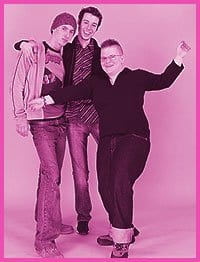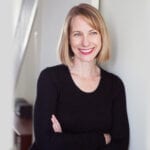Class Queers is a lesson in tenacity. Capturing several months in the lives of three gay and lesbian teenagers who attend the same alternative school in downtown Toronto, the documentary portrays their inspiring determination to survive – and even thrive – in a world that discriminates against them.
And co-director Melissa Levin is no slouch when it comes to perseverance, either. After spending a year teaching video to students at Toronto’s Triangle Program, an innovative high school for queer youth, the lesbian artist and videomaker was convinced the world needed to hear about Triangle’s heroic students. She spent two years convincing the school and funders to let her make a documentary.
“There are a lot of adults in our community who are complacent and think that our fight is over,” Levin says. “But these kids have been so slapped down – by society, by the regular school system, sometimes by their own families. I wanted to help tell their stories.”
After getting permission from Triangle and support from the CBC, Levin enlisted the help of TV veteran Roxana Spicer, who came onboard first as a mentor and then as the film’s co-director.
Then came finding the youth. “So many of the kids in the Triangle Program were great, but we narrowed it down to three who had really compelling storylines that were, to a degree, representative of the youth in the program.”
Levin calls Triangle, a transitional program that supports queer youth who are not safe nor comfortable in mainstream schools, “a lifeboat. Some kids have been harassed, some have been thrown out of their homes for being queer.” The program recently had its budget slashed, losing one staff member.
The three young people profiled in Class Queers have experienced varying degrees of struggle, Levin says, “and the documentary shows them in hard times, but also real moments of strength.”
And courage, too. Adam, a precocious and unapologetically flamboyant 17-year-old, comes to Triangle with the support of his parents, after being harassed by students, as well as teachers, at his suburban high school.
Seventeen-year-old Richard has a very different struggle. He’s trying to balance school with his chaotic home life – he lives on-and-off with his virulently homophobic mother and her equally intolerant boyfriend in a crowded one-bedroom apartment. Meanwhile, Adina, 15, the daughter of a prominent rabbi, is determined to find her own path within her conservative Jewish family and community.
The youth haven’t seen the documentary yet – they’ll be screening it together the night before the first public screening – and they admit they are nervous about the end result.
“I’m a little freaked out so I’ve been joking that it will be like the Michael Jackson documentary and I’ll have to come with my side the week after it airs,” says Richard (to protect their privacy, the doc doesn’t use last names).
“Honestly, it was hard at first to participate in this. I didn’t want to be seen as just this person with problems. But I knew it would be a good thing for people to see my experience with homophobia.”
For Richard, that homophobia comes from his mother, who tells him on camera that she thinks homosexuals are “sick” and “disgusting.” Still, Richard optimistically brings home a boyfriend to meet her. “It was difficult to go through that on camera, because it was so intense and so sad. I was crying. That was real. But in the end I don’t regret it at all. Before this documentary, I was the only gay person my mom had met. Now she’s met Melissa and my boyfriend at the time. It forced her to look at her attitudes.”
Adina went into the project feeling confident, but says that sharing so much of herself on camera was tougher than she anticipated.
“When it all began, all I was thinking about was being famous, because I’m such a media slut. It ended up being a really intense experience, probably more than I thought it would be. But the only time I didn’t like being on camera was once during a fight with my mom. I wished that could have been in private.”
According to Levin the three youth are all doing well. Adam is thriving as a dancer and singer. Adina, wrapping up her second year at Triangle, is headed off to a larger alternative school. And Richard, who has moved in with a new boyfriend, is looking for work and is preparing to write his high school equivalency exam and get his diploma.
“They are all, in their own way, really triumphant,” Levin says.
* Class Queers airs on Tue, April 29 at 10pm on CBC Newsworld’s Rough Cuts (it repeats Sat, May 3, 10pm); the world premiere is at a public screening at Innis Town Hall Theatre (2 Sussex Ave) at 7pm on Thu, Apr 24, including a question and answer session. It’s free, but with limited seating. Call (416) 205-2408.


 Why you can trust Xtra
Why you can trust Xtra


